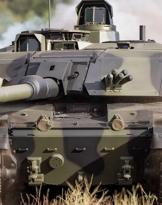The Bassel al-Assad International, an airport south of Latakia on the Mediterranean coast of Syria connected to the main port of the country, which takes its name from the dictator's elder brother, was armored by the Russians to guarantee the air bridge that now continues unabated. The airport is protected by BTR-82A armored vehicles, Sam stations and by 200 to 300 Marina infantrymen arrived in the past few hours.
The goal is to discourage any action (even Western) that could interfere with Russian plans. Moscow cannot afford to lose its influence in Syria through the Assad government and the Tartus naval base, the last Russian outpost in the region after the collapse of the Soviet Union. The two bases (it would not be a mistake to call them Russian) are monitored by the air by surveillance drones, in constant reconnaissance since last Wednesday.
Finally, the airlift continues unabated. The 'Condors' continue to transport materials and men to Syria. We know that the air corridor was allowed by Iran and partly by Iraq. Ukraine and Bulgaria, on the other hand, have barred the transit of any Russian plane bound for Syria. Greece, invited by the United States in the same attempt to block Russian air supplies, has not yet clarified its position. Turkey is currently out of the game. Although the United States and Russia agree that the Islamic State poses a threat, the new controversy shows that they remain distant about the best way to fight the militant group and the political future of President Bashar al-Assad. Divisions that could be sharpened during the UN General Assembly, scheduled in a few days.
The Russian determination, meanwhile, continues to confirm our analyzes. Moscow would be setting up a real operational outpost. And the step we had hypothesized could already have been taken: troops Specnaz (the term "spetsnaz" is the Anglo-Saxon transliteration) they would have already been deployed at the Syrian Naval Academy.
Pending the first photos released by US intelligence, we can also hypothesize the two possible departments deployed: Moscow may have opted for the 'Vympel' specnaz, already operating in Chechnya, in the Caucasus and in Ukraine. The assault unit, specializing in espionage and information gathering, has been used since the '80' also for 'targeting leader' missions.
The Kremlin, or else, could have decided to displace part of the thousand operating plants under the Voenno-Morskoj Flot Rossijskoj Federacii. Always operating under the aegis GRU, the Russians have four thousand specnazs divided into all the four main commands of the fleets. They operate in support of the Navy infantry that we already know to be in Syria. And Sevastopol, has received its own operational department for specnaz Beyond the speculations on the units, if we well know the Russian doctrine, in the next hours we can already expect eliminations aimed at undermining the emotional and organizational stability of the enemy troops.
Moscow, meanwhile, continues to reaffirm humanitarian support for the Syrian population. It is the same logic used to explain the convoys believed to have delivered military supplies to Ukrainian separatists. The same humanitarian convoys that Iran would have used to transport weapons to Damascus and support the Assad government. While the Obama administration continues to argue that Assad's brutal crackdown on his opponents has fueled sectarian passions that have strengthened the Islamic state, the Russians seem to see the Syrian president as a bulwark against extremists, at least for now. And indeed, the intentions of the Russians are not entirely clear. Because while it is true that Putin from Vladivostok has called for the creation of a coalition against the Islamic State, on the other hand the only potential members who have married the cause are Iran and the Syrian government.
Speculations can be mainly two. One possibility is that Russia is not just trying to support the Syrian government, but trying to expand its role within Syria so that it can also influence the choice of a new government in case Assad is overthrown. The second, however, is that Russia is fortifying its bases to revive a powerful and violent offensive that can restore control of the country to Damascus.
Neither possibility is mutually exclusive.
(photo: MoD Russian Federation)












